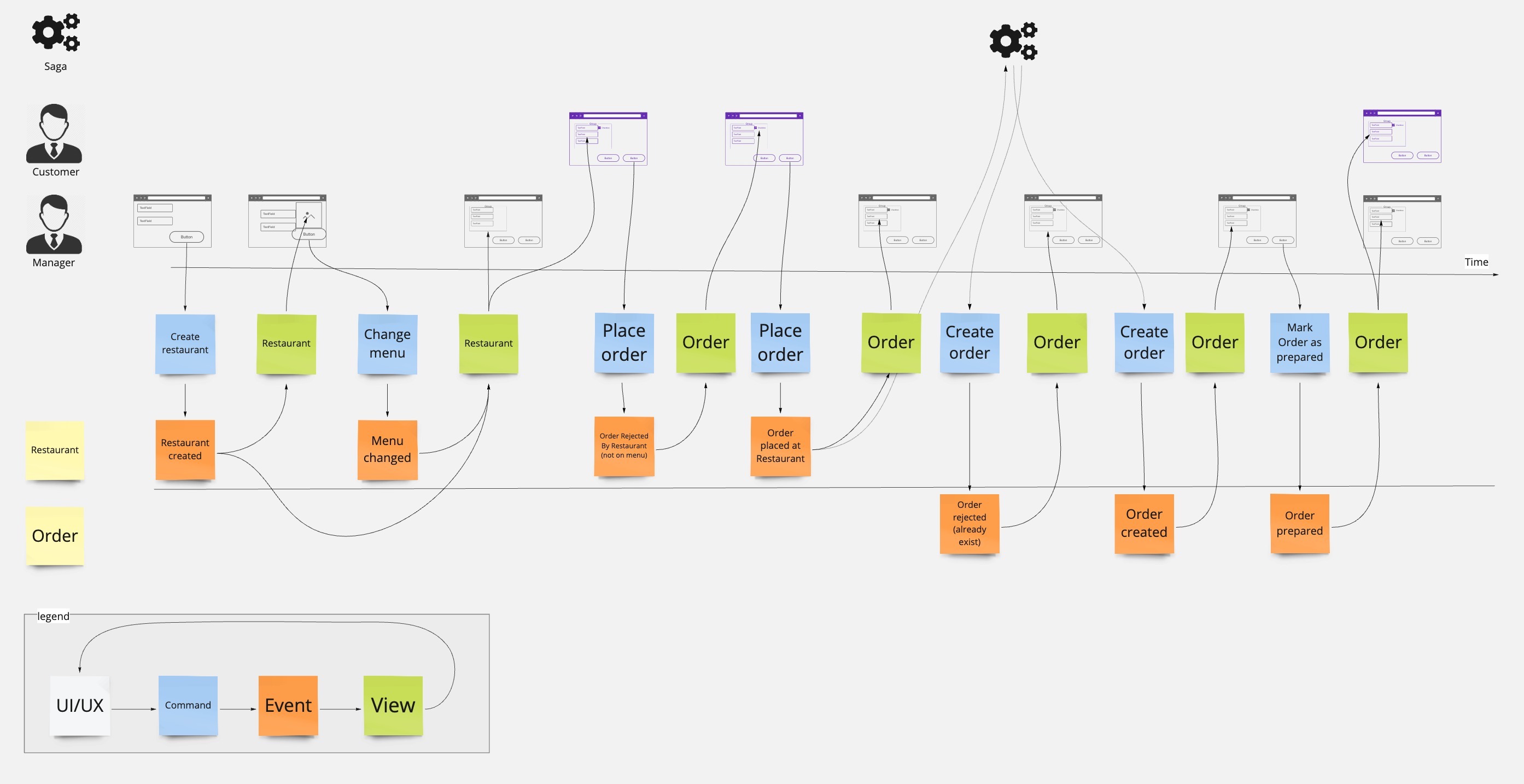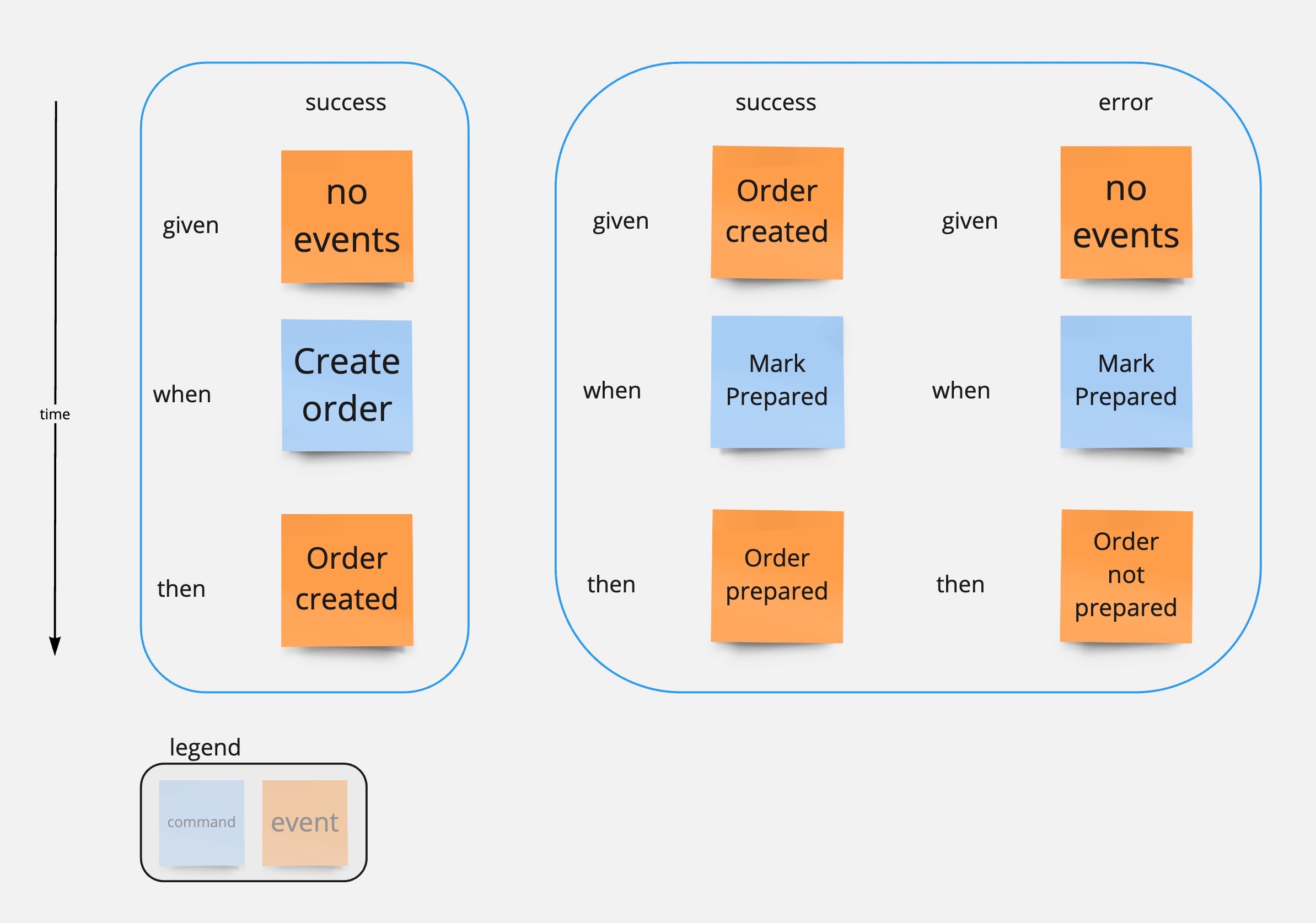Specification By Example
- It is a collaborative approach to software analysis and testing.
- It is the fastest way to align people from different roles on what exactly we need to build and how to test it.
Illustrating requirements using examples
The requirements are presented as scenarios.
A scenario is an example of the system’s behavior from the users’ perspective,
and they are specified using the Given-When-Then structure to create a testable specification:
- Given
< some precondition(s) > - When
< an action/trigger occurs > - Then
< some post condition >
We face business with specific questions they should be able to answer. We are not facing them with abstractions or generalizations. We are dealing only with data that are formally representing preconditions (events), actions (commands) and post conditions (new events):
- Given
< some event(s) / current state of our system > - When
< a command occurs > - Then
< some new event(s) / evolves to the new state of our system >
It also represents an acceptance criterion of the system, and acts as a documentation.
Refining specifications
Let's pivot the blueprint for 90 degrees, and refine our requirements further.

We need to go through all the scenarios, successes and errors.
For example, for an OrderDecider with given OrderCreatedEvent event as a precondition, when
command MarkOrderAsPreparedCommand is triggered, then Order is successfully prepared (OrderPreparedEvent).
But, without OrderCreatedEvent given as precondition, handling the same command MarkOrderAsPreparedCommand will
produce different result/failure (OrderNotPreparedEvent).
It means that order can be marked as prepared only if it was previously created/placed.

Automating tests based on examples
Functions/lambda offers the algebra of manipulating the data (commands, events, state) in a compositional manner, effectively modeling the behavior. This leads to modularity in design and a clear separation of the entity’s structure and functions/behaviour of the entity. It makes it easy to test!
You can create a small DSL in Kotlin to write and run specifications in Given-When-Then structure (testable
specification):
- Decider
- View
- Saga
fun <C, S, E> IDecider<C, S, E>.givenEvents(events: Iterable<E>, command: () -> C): Flow<E> =
decide(command(), events.fold(initialState) { s, e -> evolve(s, e) })
fun <C> whenCommand(command: C): C = command
suspend infix fun <E> Flow<E>.thenEvents(expected: Iterable<E>) = assertIterableEquals(expected, toList())
fun <S, E> IView<S, E>.givenEvents(events: Iterable<E>) = events.fold(initialState) { s, e -> evolve(s, e) }
infix fun <S, U : S> S.thenState(expected: U?) = assertEquals(expected, this)
fun <AR, A> ISaga<AR, A>.whenActionResult(actionResults: AR) = react(actionResults)
suspend infix fun <A> Flow<A>.expectActions(expected: Iterable<A>) = assertIterableEquals(expected, toList())
Runnable tests:
- Decider
- View
- Saga
@Test
fun testCreateOrder(): Unit = runBlocking {
val createOrderCommand = CreateOrderCommand(orderId, restaurantId, orderLineItems)
val orderCreatedEvent = OrderCreatedEvent(orderId, orderLineItems, restaurantId)
with(orderDecider) {
givenEvents(emptyList()) { // PRE CONDITIONS
whenCommand(createOrderCommand) // ACTION
} thenEvents listOf(orderCreatedEvent) // POST CONDITIONS
}
}
@Test
fun testMarkOrderAsPrepared(): Unit = runBlocking {
val orderCreatedEvent = OrderCreatedEvent(orderId, orderLineItems, restaurantId)
val markOrderAsPreparedCommand = MarkOrderAsPreparedCommand(orderId)
val orderPreparedEvent = OrderPreparedEvent(orderId)
with(orderDecider) {
givenEvents(listOf(orderCreatedEvent)) { // PRE CONDITIONS
whenCommand(markOrderAsPreparedCommand) // ACTION
} thenEvents listOf(orderPreparedEvent) // POST CONDITIONS
}
}
@Test
fun testMarkOrderAsPreparedDoesNotExistError(): Unit = runBlocking {
val markOrderAsPreparedCommand = MarkOrderAsPreparedCommand(orderId)
val orderNotPreparedEvent = OrderNotPreparedEvent(orderId, Reason("Order does not exist"))
with(orderDecider) {
givenEvents(emptyList()) { // PRE CONDITIONS
whenCommand(markOrderAsPreparedCommand) // ACTION
} thenEvents listOf(orderNotPreparedEvent) // POST CONDITIONS
}
}
@Test
fun testOrderCreated(): Unit = runBlocking {
val orderCreatedEvent = OrderCreatedEvent(orderId, orderLineItems, restaurantId)
val orderViewState = OrderViewState(orderId, restaurantId, orderCreatedEvent.status, orderLineItems)
with(orderView) {
givenEvents(
listOf(orderCreatedEvent)
) thenState orderViewState
}
}
@Test
fun testOrderPrepared(): Unit = runBlocking {
val orderCreatedEvent = OrderCreatedEvent(orderId, orderLineItems, restaurantId)
val orderPreparedEvent = OrderPreparedEvent(orderId)
val orderViewState = OrderViewState(orderId, restaurantId, orderPreparedEvent.status, orderLineItems)
with(orderView) {
givenEvents(
listOf(orderCreatedEvent, orderPreparedEvent)
) thenState orderViewState
}
}
@Test
fun testOrderPreparedDoesNotExistOrderError(): Unit = runBlocking {
val orderPreparedEvent = OrderPreparedEvent(orderId)
with(orderView) {
givenEvents(
listOf(orderPreparedEvent)
) thenState null
}
}
@Test
fun testOrderPlacedAtRestaurantEvent(): Unit = runBlocking {
val orderPlacedAtRestaurantEvent = OrderPlacedAtRestaurantEvent(restaurantId, orderLineItems, orderId)
val createOrderCommand = CreateOrderCommand(orderId, restaurantId, orderLineItems)
with(orderSaga) {
whenActionResult(
orderPlacedAtRestaurantEvent
) expectActions listOf(createOrderCommand)
}
}